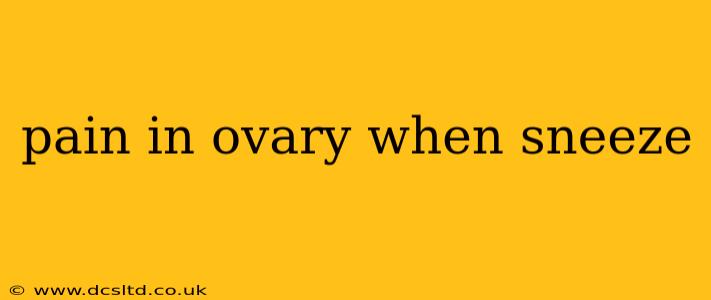Experiencing pain in your ovary when you sneeze might seem alarming, but it's often a temporary and relatively benign issue. However, understanding the potential causes is crucial for peace of mind and appropriate management. This article explores the various reasons why you might feel ovarian pain when sneezing and when to seek professional medical advice.
What Causes Ovarian Pain When Sneezing?
The connection between sneezing and ovarian pain isn't always direct. The pain is usually related to increased abdominal pressure, rather than any inherent problem with the ovaries themselves. Here's a breakdown of the most common culprits:
Increased Intra-abdominal Pressure:
Sneezing creates a sudden, forceful increase in pressure within your abdomen. This pressure can irritate existing conditions or sensitive tissues, leading to pain. This is the most frequent explanation for experiencing this type of discomfort. Think of it like this: if you already have some mild inflammation or tenderness, the added pressure from sneezing can exacerbate the feeling.
Endometriosis:
Endometriosis, a condition where tissue similar to the uterine lining grows outside the uterus, can cause chronic pelvic pain. The increased pressure from a sneeze can aggravate existing inflammation and trigger pain in the ovaries or surrounding areas. This pain can range from mild discomfort to severe cramps.
Ovarian Cysts:
Ovarian cysts are fluid-filled sacs on the ovaries. While many cysts are asymptomatic, larger or ruptured cysts can cause pain. The pressure surge from sneezing can put extra strain on a cyst, triggering pain.
Pelvic Inflammatory Disease (PID):
PID is an infection of the female reproductive organs. It's characterized by pelvic pain, which can be worsened by activities that increase abdominal pressure, including sneezing.
Ectopic Pregnancy:
While less common, an ectopic pregnancy (a pregnancy outside the uterus) can cause severe pelvic pain. Sneezing could exacerbate this pain, although it's crucial to note that other symptoms like bleeding and dizziness will also likely be present.
When Should I See a Doctor About Ovarian Pain?
While occasional ovarian pain during sneezing might be nothing to worry about, it’s important to seek medical attention if the pain:
- Is severe or persistent: Pain that doesn't subside or worsens over time warrants a doctor's visit.
- Is accompanied by other symptoms: Fever, vaginal bleeding, dizziness, or severe abdominal cramping requires immediate medical attention.
- Occurs frequently: Regular occurrences of ovarian pain during sneezing should be investigated by a healthcare professional.
- Is accompanied by changes in your menstrual cycle: Irregular periods or unusual bleeding patterns coupled with ovarian pain during sneezing warrant a consultation.
Is Ovarian Pain During Sneezing Always Serious?
No, ovarian pain when sneezing isn't always a sign of something serious. In many cases, it’s a temporary discomfort caused by increased abdominal pressure. However, the possibility of underlying conditions necessitates careful observation and prompt medical attention when symptoms warrant it.
Can Certain Positions Reduce Ovarian Pain During Sneezing?
There's no definitive position to guarantee pain relief during sneezing, as the underlying cause will dictate the efficacy of posture adjustments. However, gently supporting your abdomen with a pillow or hand might offer some minor comfort by slightly reducing the pressure surge.
What Treatments Are Available for Ovarian Pain?
Treatment for ovarian pain during sneezing depends entirely on the underlying cause. If it's due to an underlying condition like endometriosis or cysts, treatment will focus on managing that condition. Over-the-counter pain relievers like ibuprofen or acetaminophen can help manage mild discomfort. More serious conditions might require prescription medication, surgery, or other interventions.
Disclaimer: This information is for general knowledge and informational purposes only, and does not constitute medical advice. It is essential to consult with a healthcare professional for any health concerns or before making any decisions related to your health or treatment.
